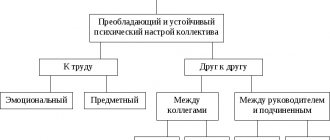You can hear many people complaining about a categorical lack of time. It seems like there is not a lot of work, but nothing really can be done. Experts say that this happens because the individual does not know how to properly plan and manage his own time. So, it’s worth talking more closely about whether it’s possible to learn to manage your time.
The ability to competently plan one’s time plays a very important role for a person, since many things accumulate in everyday life, and after solving them, one also needs to find time for family and rest.
Content
- What is time management or time management
- Who can benefit from time management?
- History of time management
- Basic components of time management
- Myths of time management
- Principles of time management or how to manage everything
- Plan your every day
- Set a goal
- Learn to fix your action plan
- Set your priorities
- Focus on the main thing and learn to delegate
- Analyze the period you have lived and create your own personal time management rules
- Don't forget to rest
- Recommendations from experts in the field of time management
- Plan your next day
- Last day
- Filter information
- Time Eaters
- Concentrating on doing one thing at a time
- Study your biological clock
- Tidy up your workspace
- Separate workplace
- Books about time management or time management
- Conclusion
What it is
Time management is a competent approach to your time. If you apply the basic principles in life, you can change it dramatically.
Poor time management leads to fatigue, procrastination and unproductivity. If you are interested in self-development, high earnings and family harmony, then time management will help with all of the above.
Time management is not a newfangled phenomenon; ancient thinkers were interested in organizing time. One of them, Seneca, said that time can be divided into: useful and useless, and strive to have more useful things in a day.
But until the 1980s, time management was only a theory, and only in the last century did principles begin to be developed that could be applied in practice. People began to explore the concept and develop effective time management techniques. Subsequently, they formed the basis of numerous books about personal effectiveness and success.
Below, check out the best ways to manage your time and change your life. The principles written below will not only increase your personal effectiveness, but also change your thinking. You will reconsider your own attitude towards life, begin to appreciate every moment and wisely distribute resources.
What is time management or time management
Look at rich and successful people. They own a big business, manage a lot of people and find time for relaxation and family. “How do successful people manage everything?” you ask. Yes, all because they know and master the basics of time management.
Time management is the ability to rationally distribute your time resources. Translated from English it means “time management”. Of course, people are not magicians and do not know how to turn back time or stop it. But we can learn to properly distribute every minute in order to manage to complete all assigned tasks. The motto of successful time managers can be considered the expression “Achieve more by working less.”
Definition
The term “time management” comes from two English words time and manage, which literally means “time management”. Initially, this definition referred to the organization of work processes in enterprises. Then the concept migrated into everyday use along with the basic principles and approaches. Today, not a single training on personal effectiveness can do without it.
Time management is a set of special methods, techniques, techniques that help increase productivity through proper organization of time. By introducing them into your life, a person becomes more effective and begins to accomplish more. His techniques are universal and suitable for both men and women.
Time management is based on knowledge about human psychology. Rich research experience has made it possible to identify objective patterns in the psyche of people that determine their productivity.
For example, scientists have found that the maximum time you can concentrate on one task without a break is 90 minutes. Then the brain begins to switch involuntarily. This knowledge formed the basis of several laws and principles of time management.
Today, there are departments of time management in several Russian universities. Even a new profession has appeared - time manager. This is a specialist who helps people organize their activities as efficiently as possible, taking into account their psychological characteristics. The clients of time managers most often are managers of large companies who want to optimize the work process and increase labor productivity.
Who can benefit from time management?
People have different needs and different responsibilities. Don’t think that the problem of lack of free time is a problem only for managers and wealthy people. In fact, learning to do the maximum number of things in a certain period of time begins in childhood.
Let's remember at least the child's daily routine. Surely many people have a poster “Lesson schedule and daily routine” hanging at home. Thanks to him, children follow a daily routine and are disciplined.
If you are asking questions: “How to work and manage to do everything around the house as a woman with a child,” “How to learn to do everything faster and not get tired,” then these questions are relevant for you, especially if you are a young mother. Some representatives of the fair sex manage to look after three children, take care of themselves and their husbands, and some cannot cope with even one child.
Therefore, you should not think that time management is a useless science that is unlikely to be useful to you in life. In fact, if you learn to control your time, you will find happiness and harmony in all areas of your life.
Kinds
There are many classification systems for time management. But let's talk about separation by place of application:
- Private;
- Social;
- Professional.
Personal time management talks about the distribution of time in your personal life. This is self-improvement, time for hobbies, walks, development, striving for goals.
An indicator of successful personal time management is personal efficiency. If you manage to do everything, have enough energy for the planned tasks, grow as a person, it means that your time is organized correctly. If everything falls out of your hands, you don’t have the strength, you don’t have time to do anything and you always put it off, it means that your personal time management is clearly in a deplorable state and you need to reconsider your schedule and approach.
Social time management is about time devoted to relationships with people. People are social creatures, they need love, communication, friendship, sharing experiences and emotions. To satisfy these needs, we form romantic, friendly, and work relationships. You need to work on any relationship, devote time to your loved ones. Social time management is needed in order not to move away from family and friends, and to satisfy the need for communication.
Professional time management, as you might guess, about working time. If you can organize it correctly, you will constantly grow as a professional, increase your value and expertise. It doesn’t matter who you are: an ordinary employee, a department manager, or a business owner, it is important to be able to manage time in order to do quality work and meet deadlines.
To be happy, you need to develop in all three areas of time management, and not focus on one. But it all depends on the specific situation. Right now, sit down and think about which of the three varieties needs reorganization the most. Rate your success on a scale of ten:
- personal growth;
- family, friendship;
- At work.
The following sections will help in any direction, regardless of the answer.
History of time management
Since ancient times, people have tried to distribute their labor resources as efficiently as possible, therefore, back in Ancient Rome, the philosopher Seneca began to distribute the time spent between that which he spent usefully and that which was useless. If a famous thinker did something useful, then such time was considered good, useless - bad.
Later, Seneca began to record what he did and when. After this, he analyzed the time spent and assessed its effectiveness. We can say that he was building a system of effective time management. In the 15th century, the famous Italian scientist Alberti argued that people who know how to manage their time profitably will always be successful.
Already in the 19th century, a labor institute was created, where many famous personalities worked. For example, biologist Lyubyashchev A.A. invented the timekeeping method. It is now successfully used in a large number of enterprises, analyzing the working time of each specialist.
Timing allows you to analyze how much time a person needs to complete a certain task.
Planning
Planning is an important part of time management. Without it, it is impossible to rationally allocate time. If there is no planned to-do list in the morning, then the day is unlikely to be productive. You may forget about important things, constantly switch from one thing to another, take on everything in a row, or do nothing. The result is zero efficiency and a waste of the day.
When planning, you will avoid all of the above. It allows you to allocate time and know exactly the hours spent on each task.
Here is a sample to-do list:
- Waking up, washing;
- Charging – 15 minutes;
- Reading – 30 minutes;
- Breakfast – 15 minutes;
- Work – 8 hours;
- Lunch – 30 minutes;
- Family trip to the cinema – 2 hours;
- Dinner – 30 minutes;
- Rest;
- Sleep – 8 hours.
You can make a different list, because each person has a different work schedule, interests and hobbies. Don’t put off writing a list until the end of reading the article, but right now take a piece of paper and write down the ideal daily routine in your opinion. Next, you will change it according to the principles of time management outlined below.
If your dream day seems unattainable, and you don’t want to write it down because “you won’t be able to live like that anyway,” then immediately throw these thoughts out of your head. Everything is achievable and doable. Remember this. The main thing in any business is desire.
Even with 12-hour shift work, you can distribute your time so that you still have time left for family, friends and hobbies. So don't be afraid to dream. Dreams turn into goals, and goals are easy to achieve, the main thing is to start.
Basic components of time management
Before you begin to study the basic rules of time management, you need to know what parts it consists of. That is, what you will need to do, and thanks to which you will learn to manage your time:
- Strict accounting of all time;
- Optimization of working time resources;
- Daily planning of your day;
- Constant motivation.
You need to manage your time not only during working hours, but also during rest periods. This will help you better restore your strength, and will also give you the opportunity to feel happy, self-sufficient and successful.
Is it possible to manage your time?
The discussion about whether it is possible to manage your own time is more relevant than ever. But while some are only thinking about this issue, others are effectively managing their time resources and living happily. But learning this art will not be so easy; to do everything correctly, you must follow these instructions:
- do not remember or regret the time that was wasted in the past, but act right here and now;
- try to look at your own way of life from the outside, analyze what was wrong and how to organize everything better;
- gather all your will into a fist, draw up a clear action plan and follow it.
By adhering to these rules, each person can learn to manage the temporary resource that he has in stock. The main thing is to understand that all people have the same amount of time in a day, and only those who have learned to plan their affairs correctly can manage time rationally and achieve real success.
Myths of time management
Not every citizen of our country has even heard that you can skillfully manage your time. Accordingly, many people are not even aware of the existence of time management techniques. But if a person nevertheless becomes interested and superficially familiarizes himself with the minimum information about this art, then he immediately becomes hostage to many fears. Let's look at the most popular fears related to time management.
- No one can control time, so life has and will continue to take its course. This is a false statement, because you yourself are the masters of your destiny. It depends only on you how quickly the work will be completed and how much time will be left for relaxation and communication with friends. By mastering useful time-saving habits, you will manage not your time, but your life;
- Thanks to time management, you will have to work more. Some people are really afraid that if they have free time, they will have to do more unplanned work. In fact, time management allows you to optimize all processes, and you are unlikely to have time to do unplanned work;
- By adhering to the rules of time management, you can turn into a robot. Many people think that if they completely plan their life, they can lose all human joys. In fact, time management does not take up time, but rather helps you find an extra hour or two that you can spend on yourself.
Why manage time
The ability to manage time and clearly see priorities allows you to:
- achieve goals with minimal costs;
- achieve high results in several areas of life at once;
- manage time rationally, have time to work, relax, and engage in hobbies;
- work in multitasking conditions, engage in several projects in parallel;
- increase material well-being, improve health;
- to be free, to always have a choice;
- control lives, make plans for the future.
A person who feels that it is he who controls time, and not time, worries less. He is more confident in his own abilities and is able to make long-term and realistic plans. A person who has mastered time management becomes the master of his own life.
Such people are positive, enthusiastic, and have sparkling eyes. They solve a huge number of tasks every day, but at the same time they do not look exhausted or tired. On the contrary, their energy is overflowing. The secret is simple - they know how to competently manage every second of their lives.
Principles of time management or how to manage everything
The art of managing your time is a rather complex science, which can take more than one year to study. But we tried to highlight the basic principles of time management that will help to properly organize each person’s day.
Plan your every day
Every day before you go to bed, try to take a few minutes to write down a plan for the next day. This can be done on a piece of paper or on a display board. Write down every minute of your time, not forgetting about rest and force majeure circumstances. Don’t forget to devote enough time to these particular points, because no one is immune from unforeseen difficulties.
Always carry your plan with you (if it is written in a notebook or diary), look at it periodically and check whether you are within the allotted time. Cross out or erase completed items. This way you will feel self-satisfied with the work done.
Set a goal
Every person has a dream that turns into a specific goal. People who set themselves certain goals and know what they are working for find it easier to achieve what they want.
For example, if you are an ordinary average office worker, but your goal is to be a leader, then you need to get the appropriate education, prove yourself well before your superiors, and do your job well. In this case, you have a great chance of moving up the career ladder. Perhaps in the future you will open your own business. And ideally, you will introduce a corporate time management standard in your organization. The main thing is to really want it and not sit idly by.
It is important to learn how to set goals correctly. First, think about what exactly you want. Your goal should be specific, achievable, relevant, measurable and time-bound. There is no need to dream that living in the outback and working in a small factory, you will be able to become president in a couple of years. Set realistic goals for yourself and go towards your cherished dream.
Learn to fix your action plan
You already know about the importance of making plans, now let’s look together at how to properly plan your affairs.
The Gantt Chart will help us with this. This is, at first glance, a difficult method that not everyone can handle. But it's actually quite simple. Let's look at how this method works using an example.
You need to build a house. You prescribe all stages of construction (design, laying the foundation, ground, finishing work, etc.) After which you enter the data into a table and indicate the timing and order of their implementation. Some small processes, the implementation of which does not affect the quality of work, can be combined, thereby reducing the time for their implementation.
Drawing up such a diagram allows you to clearly explain the scale of the work being performed, thanks to which workers get involved in the process faster.
Set your priorities
To achieve a goal, each person has to perform a number of tasks of varying severity. Therefore, you need to learn to prioritize and highlight the most important processes.
In order to properly plan your day, you can use a simple principle. It's called the ABCD method. Its essence is as follows. You make a plan for the day, starting with the most important things. That is, by “A” we mean the execution of the most important process, by “B” - less important, “C” - not very important, etc.
The most difficult and important tasks should be scheduled for the next morning, or your most productive period. The fact is that if you don’t complete the most difficult task right away and constantly put it off until later, then the feeling of unfulfilled duty will weigh on you emotionally. A well-known expert in the field of active time management, B. Tracy, advises approaching such issues strictly and unambiguously. He is the author of the “Have Frog Breakfast” time management method, which is successfully used by a huge number of people.
Its essence is as follows. You perform the most difficult and time-consuming tasks (“frogs”) first. This is necessary so that you have time to do all the planned things, and your emotional background remains normal throughout the day.
A logical continuation of the frog method is the Pareto principle or law. It says that 20% of all our efforts produce 80% results, and the remaining 80% of efforts produce only 20% results.
That is why the main task of everyone is to identify the most effective 20% and concentrate on their implementation. There is another method that helps you prioritize everything. It's called the Eisenhower Matrix. The famous successful politician was famous for his practicality. He divides all his affairs into 4 categories:
- Urgent and important . These things need to be done first. Because of their importance, they should not be entrusted to others. If you delay in completing such tasks, this may be fraught with negative consequences in the future;
- Important, but not urgent . Pay attention to this point. It is from this category of tasks that you can perform planning. But you should not put off their implementation for a long time, because these matters can become urgent and important;
- Urgent, but not very important . Such things generally take a lot of time, so they can be delegated, that is, entrusted to someone;
- Unimportant and non-urgent . It’s better to cross them off the list altogether so as not to waste your time. Try using these methods, and within a few days you will understand how effective they are.
Focus on the main thing and learn to delegate
Every person has a huge number of things to do during the day. Some of them may take you a few minutes, while others may take several hours. Try to take on all difficult and important tasks yourself, and entrust less important ones to other people.
For example, if no one in the family except mom knows how to cook borscht, and in addition to dinner, you also need to wipe off the dust and put away toys, then it would be rational to entrust the cleaning to the children or dad while mom prepares dinner. In this situation, everyone is fed, and the apartment is cleaned.
Or another example, if you earn several thousand rubles a day every day and your faucet is leaking, then it is easier to entrust the repair work to a plumber and pay him a couple of hundred, while you will earn several times more during this time. Master the principles of delegation, i.e. do not be afraid to shift some of your responsibilities to others.
Analyze the period you have lived and create your own personal time management rules
Periodically look back and try to analyze the period you have lived through. Pay attention to how rationally you spent your time, how quickly you achieved your goal, what difficulties you encountered along the way, etc. Regularly analyze your life and note how fast it moves, whether you are completely satisfied with your actions . Based on the basic principles of time management, create your own rules that help you optimize your time resources and feel like a happy and successful person.
Don't forget to rest
Plan your vacation as one of your main tasks. The quality and speed of the work performed depends on how well you have restored your strength. Don't neglect sleep. An adult should sleep at least 8 hours a day. Otherwise, you are guaranteed depression and loss of strength, and these are the main enemies of productive work.
Don't forget to communicate with friends and loved ones. Don't give up on your hobbies and interests. Having a pleasant time helps a person relax and makes his life brighter.
Methods and techniques
We have already become familiar with some time management methods. Let's look at a few more.
10 minute method
If there is a task that you really don’t want to do, tell yourself: “I’ll do this for just 10 minutes, and then I’ll move on to something more enjoyable.” As a rule, this time is enough to get involved and not stop.
Pareto principle
According to this principle, 20% of our deeds bring us 80% of the result, and the remaining 80% of the deeds bring us only 20% of the result. Our task is to figure out which activities are the most productive and focus on them.
Parkinson's Law
The task fills all the time allocated to it. In simple terms, if you have two weeks to prepare for exams, you will finish your preparation right by the end of the second week. Even if all the material can be learned in one evening. An important rule follows from this law - be sure to set deadlines!
Kanban method
“Kanban” is translated from Japanese as “card”. This method allows you to visualize the process of planning and executing tasks.
Take a sticky board and divide it into three columns: Need to Do, Doing, and Done. Then write all your tasks on sticky notes and place them in columns. As you complete tasks, move cards from one column to another. Instead of a board with cards, you can use some kind of to-do organization service like Trello.
You will find more tools from the time management arsenal in our article “Time Management Techniques”.
Recommendations from experts in the field of time management
Plan your next day
When you go to bed, outline the tasks that you would like to accomplish tomorrow. It is better to write down all the points so as not to miss anything, because a person is not a robot and he tends to forget some little things.
It is better to do planning in the evening. That is, in the evening of today you are thinking about the next one. This allows you to significantly optimize your time resources; in other words, you manage your time wisely.
Last day
Try to live every day as if it were your last. Don't put off doing important things. Things for which there is constantly not enough time sometimes remain in plans, i.e., unrealized. Therefore, give your best every day if possible. Thanks to this, you will not have a lot of routine and uninteresting work to accumulate.
Filter information
When studying certain information on the Internet or printed publications, try to highlight the main aspects of the article and “skim” over them. Very often, the information provided is filled with various advertisements, or excesses of the authors’ arguments, i.e., “water”. Learn to read “through the line”, this will significantly save your time.
Time Eaters
Modern people spend a lot of time viewing absolutely unnecessary information on social media. networks and other Internet resources, as well as useless conversations on the phone.
But time is a resource that cannot be replenished. In order to understand how expensive it is for you, calculate approximately how much you earn per hour. Now think about how much time and money you are wasting in vain. Even if you don’t translate all this into a monetary equivalent, think that instead of empty chatter on the phone, you could read a book to your child or play with him. And this is much more useful and will bring more satisfaction.
Of course, isolating yourself from everyone and stopping communicating with friends is also not an option. But try to minimize communication with truly unnecessary people. Learn to say “No” to them.
Analyze your habits and identify your “time wasters”. Gradually get rid of them, learn to manage yourself.
Concentrating on doing one thing at a time
Try not to take on several tasks at the same time. This way you will scatter your strength, and your attention will be scattered. You'll take longer to complete each process. Take one task and complete it completely, then move on to the next.
History knows some people who could do several things at once (for example, Julius Caesar), but they are just the exception to the rule.
But there are processes that can and should be combined. For example, riding public transport takes a lot of time for most people. Why not educate yourself at this time? After all, you can listen to an audiobook, or read an interesting magazine.
Experts advise not to grab everything. It is better to slowly and confidently move towards your goal, completing each task efficiently.
Study your biological clock
The rhythm of life is individual for each person. For some, the peak of activity occurs in the morning, while others sleep until lunch and begin to work in the evening. Only you yourself know when you have the best energy and highest performance. It is during this period that you try to complete the maximum amount of pre-planned work. Do it at one time.
Tidy up your workspace
All successful people have perfect order in their workplace. This applies to both a regular table and a PC desktop. Have you ever noticed how much time you spend searching for a document? Scientists have calculated that people who have a mess in their workplace spend 30% of their time searching for the necessary document, tool, etc. Put things in order, recycle unnecessary papers, get rid of trash. Thanks to this, you will feel comfortable and your performance will increase.
Separate workplace
If you work at home and think that your entire home is a workplace, then you are deeply mistaken. While you're working, you may be distracted by a lot of little things. Try to arrange your own corner where all your things necessary for the work process will be stored.
For example, if you sew clothes at home, then you should not scatter sewing supplies throughout the apartment. Finding the necessary item will take a lot of time. By arranging your workplace, you will save yourself from additional cleaning and constant searching.
Books about time management or time management
If you have seriously decided to change your life and want to learn more about time management, then you will find it useful to read the following books. They are the works of well-known specialists in this field and are very popular:
- “Master of Time”, author Evgeny Popov.
- “Extreme Time Management”, authors Nikolai Mrochkovsky and Alexey Tolkachev.
- "Getting Things Done or the Art of Stress-Free Productivity" by David Allen.
- “Time Drive”, author Gleb Arkhangelsky.
- “Effective Time Management”, “Leave the Disgust, Eat the Frog”, “Manage Your Time”, by Brian Tracy.
- Time is Money by Matthew Edlung.
- "Time management. The art of planning and managing your time and your life,” by Julia Morgenstern.
- Integrated Time Management by Steve Prentice.
- How to Manage Life and Work by Don Aslett and Carol Cartaino.
- “Your time is in your hands”, author, Lothar Seiwert.
- Tight Time Management by Dan Kennedy.
- "The Art of Getting It Done" by Alan Lacain.
- "Full order. A weekly plan to combat chaos at work, home and in your head, by Regina Leeds.
- “Work less, accomplish more. Personal Effectiveness Program by Carrie Gleason.
Time planning services
Let's move on to applications and services that make life, planning and time management easier.
- Clear – applications for the iOS operating system. It allows you to keep to-do lists, distribute tasks by priority or topic, group them, schedule them in stages, and so on. The advantage of this program is its user-friendly interface and ease of use.
- Trello is an application that helps you plan and mark completed tasks. Music in this program reduces stress levels and makes you more productive. Before you start working in the application, you need to take a survey so that the program adapts to your type of thinking: logical or abstract.
- Sectograph is an Android application that presents the daily to-do list in the form of a diagram; it is convenient and visual, because a person absorbs visual information better. Different tasks are marked in different colors, and the user can count down the time until the end of the task.
- Workflow is a colorful program with a user-friendly interface. You can create shortcuts on your desktop as a reminder or note. Available for the iOS operating system.
- Clara is a program that helps you plan and coordinate meetings, negotiations and other matters.
- Nirvana is a useful time management service. The program helps you get rid of unnecessary memorization, monitors the completion of tasks and reminds you of future ones.











